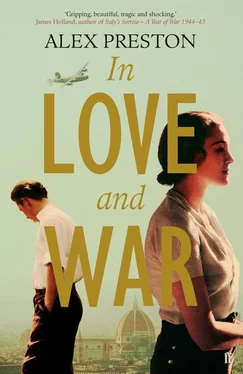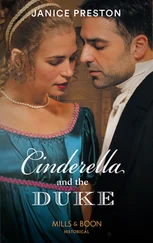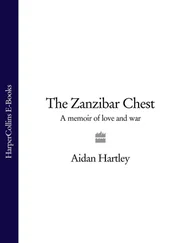We played charades all afternoon until Reggie fell asleep in a chair and Goad and Bailey started arguing about the war. So Gerald and Ada and I went out to walk about the city in our galoshes, looking at the ice floes in the Arno, the bright windows of the shops on the via de’ Corsi, snow settling on the cathedral: heavily around the lantern and then thinning out to a dusting as the roof slopes. I have a picture in my mind of the three of us, standing in the empty square looking up at the spiralling snow, the scab-coloured roof glowing beneath it. It felt like being with Fiamma, but now we look older and wounded.
Ada went home and Gerald and I found the bar of the Excelsior open, and we sat on the high stools and drank. The longer we sat there, the easier it was to see Gerald as he had been a year and a half earlier: dashing, rather dangerous. Sexful, as they used to say. We came out of the hotel drunk and it was dark, our footsteps squeaking on the snow. An icy corridor of wind swept down the Lungarno and we burrowed into our overcoats. It reminded me of Philip and the rain storm in Grantchester, and I suppose for that reason I kissed Gerald below the statue of Justice at the end of the via delle Terme. His breath was sour, and there was something too ardent and grateful in the way he kissed me back. I broke off quickly and said goodbye. I stood on the Ponte Santa Trinità until I was frozen sober, thoroughly depressed.
I came back to the church and tried to work on the novel, but it all seemed predictable and tiresome. So now I’m here, earlier than usual, speaking to you. Happy Christmas, whoever-you-are. I’m off to sleep with my hangover.’
6 . A-Side:‘Dante Today — the Enduring Legacy of the Divine Comedy’ , a lecture by Alessandro Pavolini (31′ 51″)
B-Side:‘Bailey’s obsessed by the Finnish campaign. More by the pluck of the Finns than anything. The way they simply won’t give up, even with the aerial bombardments, the tanks, the Russians’ vastly superior numbers. We’re all cheering them on, but I can’t think they’ll be able to hold out much longer. I have an image of them: mostly blond, snow-dusted men with blue eyes and unpronounceable names skiing in white fatigues through the endless Arctic night. Rudyard is in France, digging in around the Maginot Line. He wrote me a card — thoroughly censored, of course. He sounds like a man, even in those few words. I wish I’d known him better when we were young. It made me think how alliances form in families, how Anna and I were so close we pushed the others away. I still miss her almost every day. It seems absurd that she should be dead and not there, in her room, waiting for me. That someone so abounding with kindness should act so pitilessly as to die.
Pavolini came to see Goad and me today, ostensibly to record his thoughts on Dante’s legacy in contemporary European poetry — actually rather interesting — but in fact to issue instructions about our broadcasts. He’s seen the success William Joyce is having in Germany — Lord Haw-Haw of Zeesen they call him there — and he wants us to mirror it. To become a propaganda mouthpiece for Musso. The way he put it to us was that Il Duce is certain to get into the war at some point; he’s like a hunter waiting for the optimum moment to shoot; and that we need to make up our minds now which side we’re on when Italy squares up to Britain. Goad and I sat on for a long time after he left. One of Pavolini’s requirements was that we give over a half-hour every day to PNF propaganda that he will script for us. Justifications of the war in Abyssinia, praise for the Italian military machine, hagiographies of Il Duce . I’ve heard the Joyce broadcasts and there’s not a chance we’d do something like that, but Pavolini is an intelligent man. Certainly no one who knows Dante like he does, who writes so delicately about poetry and music, can be all bad.
We’ve agreed we’ll see how it goes — there’s no gain in shutting things down before we see quite how invasive he’ll be. After Goad left, I stood in the studio looking out at the piazza getting rained on. My father wrote me one last letter, cutting me off. As far as he’s concerned I’m no longer his son. If I won’t be a warrior, I no longer deserve the name Lowndes. It draws a line under things, I suppose.
If only it wasn’t so very clear what’ll happen to me if I go back. A hair-raising voyage aboard some submarine-stalked ship, a few days at home with the ghost of Anna in every room, then to London with my pa, fitted out at Gieves’, on the train at Victoria and pow! a bullet in the brain a week or — worse — a year later. I went down to the church after dinner. I turned on the altar lights and sat looking at the triptych for an hour or so. I feel crumpled, hollowed out, like those three figures in the painting. It’s as if Florence has seen me go from a boy who could feel sensuous about Primavera and The Birth of Venus to a man who can only relate to withered creatures. Don’t think I’m not ashamed of my fear: I am. I feel like a bloody hole. But shame, as Marx said, is a revolutionary feeling. Perhaps it will push me into action.
I saw crocuses growing in the Cascine today. Spring is on its way. Good night.’
7 . A-Side:Shakespeare’s The Merchant of Venice : a consideration by Harold Goad (28′ 28″)
B-Side:‘The war is utterly confounding. Even Bailey seems to have given up moving his figures around the kitchen table. There’s mushroom sauce across Scandinavia, a blob of passata in the waters of the Indian Ocean. I’ve been learning how to cook — we’d grown bored with eggs on toast. All we had as far as cookbooks were concerned was Douglas’s collection of aphrodisiacal recipes, but I’m now able to fashion a passable pastasciutta , an encouraging gnocchi al ragù, a frankly hopeful cinghiale salsa agrodolce . I’ve converted Bailey to wine. He was teetotal when I turned up and now we get through a bottle of Chianti most evenings. I’ve started broadcasting Pavolini’s propaganda. Generally fairly tame stuff, but today there was something on the Manifesto of Racial Scientists. It wasn’t too evil, just the usual guff linking the Jews to the Reds who are disrupting the factories, how there will now be stricter curfews. They wanted us to get Guido Landra, their pet eugenicist on, but Goad drew the line.
All the time I was reading it, I was watching Ada’s face. That cold angularity, the way her eyes leave and she follows. I shiver to look at her when she gets like that. It became harder and harder to read the words. I realised how much power there is in those bureaucratic phrases, in the canted, abstract language of the State. I felt, with the suddenness of instinct, that the words I was reading meant something concrete, that translated into actions by Blackshirt thugs on the streets of Turin or Naples, into education or medication denied to Jewish children, into the concentration camp they’re building in Campagna. That speech carried a dreadful weight, a weight that would finally fall on Ada’s shoulders. I felt my throat closing up, choking off the words as I read them. I barely got through it. When I reached the end, silence like a fog came over us, and I felt as if I’d just carried out some atrocity, some appalling crime as I read. Ada got up from the sound desk and practically ran. I went after her, heard Goad following me. Her footsteps echoed down the stairwell, then the clatter of the wicket gate.
I finally caught up with her at the midpoint of the Ponte Santa Trinità. She was running very quickly. It must have been six — people were walking home from their jobs, standing around in the spring sunlight, watching the fishermen on the Arno. To stop her, I put my arms around her, and she was heaving with sobs, tears streaming down her freckled blue cheeks, onto the soft linen of her shirt where I could see her collarbones pushing through, see her small breasts, and then I was kissing her and I pulled her tightly to me, and the river flowing under us, the rumorous hum of the city, the milky sky overhead, all of them seemed to stop for a moment — we were the still point and the world was rising to a blister on our lips, at the intersection of our bodies as they pressed hopelessly together. I drew back for a moment and stared at her, feeling as if another sun had risen. Then we started kissing again, urgently, both of us. When we pulled back for a second time, I saw Goad at the foot of the bridge, watching. I tore myself away from her, and that was what it felt like: as if our bodies had fused for a moment and now we tore flesh as we parted.
Читать дальше












